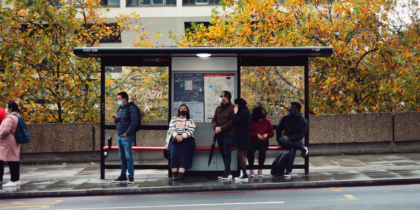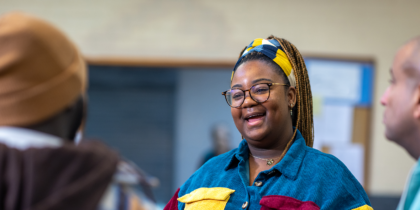Luton has a population of 213,502 and is more densely populated than some London boroughs. It is one of the most ethnically diverse towns in England with 61.8% of the population from a racialised community: notably Pakistani, Bangladeshi, Indian, Eastern European, and African Caribbean communities. Luton has an Index of Multiple Deprivation score of 41, with high levels of deprivation concentrated in some wards. Luton Council has developed a 2040 vision with the aim of Luton becoming a fairer town. It is the first Marmot Town – a place which has pledged to implement the key findings from the Marmot report, taking concerted action on the social determinants of ill health, including income, housing and education. Marmot Places are making a significant commitment to address the social determinants of health inequalities, as evidenced by clear policies and plans to achieve this. Luton Council is working with The Young Foundation to understand change and place.
The Council launched a community engagement project in early 2021, in partnership with the Institute of Health Research, University of Bedfordshire. The aim of this project – Covid 19: Talk, Listen, Change – was to understand the disproportionate impact of Covid-19 on Luton’s racialised communities. Mental health and wellbeing emerged as a strong theme and the Fund was welcomed as it provided a timely opportunity to address this.
For more information about the local area, see: Luton Joint Strategic Needs Assessment
Identifying the focus of Better Mental Health Fund
Through the town’s Fairness Taskforce, the Better Mental Health Fund was used to enhance participatory budgeting to support grassroots projects, community groups and voluntary sector organisations to deliver projects to address needs identified by residents. The aim was to ensure access and support for people for whom access to appropriate health care is problematic.
Several projects had identified the need for better mental health support:
- The community engagement project – Talk, Listen, Change – identified the impact of Covid on the mental health, specifically loneliness and bereavement, of older people, children and young people, and people from racialised communities living in Luton’s most deprived wards. It also highlighted a lack of understanding on how to recognise and support someone experiencing poor mental health in all communities
- A local Healthwatch 2019 report, which indicated that people wanted to see more support in prevention and early intervention in mental health, better awareness of available services and reduced waiting times
- A Mental Health Needs Assessment (MHNA) providing insight into local services and an understanding of the need and engagement with services during the pandemic. It found that:
- The number of Luton’s population living with a ‘common mental disorder’ was estimated to be 25,582 in 2020 and anticipated to rise to almost 27,000 by 2035. Around 59% of these cases are females.
- The rate for common mental disorders in Luton is higher than the England average: the rate for people aged 16+ is 19.3% compared with an England average of 16.9%, and for people over 65, the rate is 11.4% compared with a national average of 10.2%.
Furthermore, it was evident that the ethnic profile of people using Improving Access to Psychological Therapies (IAPT) services does not reflect Luton’s underlying population profile. The provision of a culturally appropriate service aimed to address this.
How was the Better Mental Health Fund used?
The Fund was used for the following projects:
- Mental Health First Aid (MHFA) for people working with community and voluntary sector organisations so they can better support their clients and their employees
- The Fairness Taskforce: Community Centred Approaches to Support Mental Wellbeing: participatory budgeting with citizens making decisions about how money is allocated to community and voluntary organisations
- Improving access to talking therapies and reducing mental health-related stigma for racialised and marginalised communities
- A six-month mental health promotion campaign, based on the Five Ways to Wellbeing, with signposting to local projects in different languages. The campaign was coproduced and commissioned with local communities to ensure that it was inclusive.
The MHFA project was delivered by Adult Community Learning and aimed to provide training for 200 people working with the community and voluntary sector so they could better support their clients and their employees.
The Participatory Budgeting programme was managed by the council and the funds were allocated to grassroots organisations through a decision-making process involving local citizens.
Initially, local providers of psychological therapies were approached to provide culturally adapted CBT, but delays were experienced because of difficulties in recruiting appropriately qualified staff. Our Minds Matter, a local organisation working with people of colour is building staff capacity to deliver and embed the approach in the work of the organisation.
Participatory Budgeting
Participatory Budgeting, a model of micro-commissioning, was adopted in Luton ten years ago. The Fund, combined with funding for violence reduction and Covid recovery, has enabled a six times increase in the allocation.
The process involves a Citizens Think Tank, open to anyone in Luton. This is usually followed by Citizens’ Days, which had to be adapted because of Covid and, instead, the proposals went to a Community Panel. 68 projects were funded, with organisations receiving up to £3,500. These grants supported a wide range of activities including a Parkinson’s Support Group; a local youth football team to play in a youth tournament at Crystal Palace; a new LGBT group; a ‘Big Iftar’ to celebrate the end of the daily Ramadan fast with 1,000 residents participating; debt advice; culturally appropriate bereavement support; and a parent and teen wellbeing programme.
This funding allowed the local authority to flex to local need and is being evaluated to understand how the money has been spent and the impact created. All projects were ‘bottom up’.
Exploring the impact of Covid: Talk, Listen, Change
This started as a community engagement project to explore the impact of Covid with local community members. Led by Dr Nasreen Ali from the Institute of Health Research at the University of Bedfordshire, the project used an ethnographic approach employing researchers from the local communities. The approach aims to be intersectional, recognising the diversity of experience within communities.
The methods included:
- An online community survey to allow residents to share their views
- Online focus group discussions with people of colour living in wards most affected by Covid
- One to one interviews with frontline health and social care workers
- Community debates via online events.
This initiative was part of the work plan of the Health Inequalities Delivery Board, a sub-group of the Health and Wellbeing Board.
Impact on local people
The initial goal of reaching 2,919 beneficiaries was exceeded – 19,828 people were engaged in projects. It is not possible to say anything definitive about age, sex and ethnicity as the characteristics of more than 19,000 beneficiaries were unknown. There were numerous challenges for voluntary sector partners in knowing how to collect data.
What have we learnt?
The grants allocated to grassroots organisations served as ‘seed money’ for these groups to build their capacity, enabling unconstituted groups to become constituted. They were also buddied with constituted groups, which can act as an intermediary. These unconstituted groups are seen as the foundation of the support ecosystem – “the lichen which allows the rest to grow” because they ensure that the funding goes to address local need.
The investment in grassroots organisations has the potential to increase the understanding of local needs and assets. This will provide a foundation to maximise investment, ensure all seldom-heard groups (such as the local Gypsy and Roma Traveller community) are being reached, and to target future funding to projects with the biggest impact.
The experience confirmed the value of community engagement in identifying the assets and needs of seldom-heard communities.
The experience of implementing culturally appropriate CBT highlighted systemic inequalities in access to education and employment. Despite the ethnic profile of the local residents, there is a shortage of appropriately qualified culturally competent CBT practitioners in England. A strategic approach to workforce development – including building cultural competence – would help tackle inequalities.
The funding for subsequent years will be linked to the overarching 2040 Vision, showing how the Fund has had impact at systems-level. There is a commitment to participatory budgeting. The MHFA initiative and the mental health promotion campaign will leave a legacy by improving local people’s knowledge and literacy in relation to mental health and the available services.
Local evaluation
An independent evaluation is being undertaken by the University of Bedfordshire. The local authority is working with Bedfordshire and Luton Community Foundation to ensure that the participatory budgeting approach is proportionate and relevant. This involves collection of stories to demonstrate impact visits by ward members and feedback.



